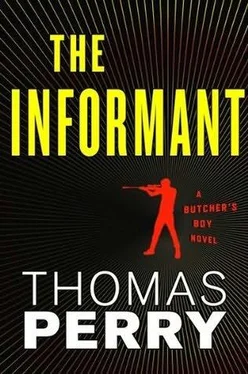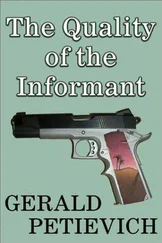Thomas Perry - The Informant
Здесь есть возможность читать онлайн «Thomas Perry - The Informant» весь текст электронной книги совершенно бесплатно (целиком полную версию без сокращений). В некоторых случаях можно слушать аудио, скачать через торрент в формате fb2 и присутствует краткое содержание. Жанр: Триллер, на английском языке. Описание произведения, (предисловие) а так же отзывы посетителей доступны на портале библиотеки ЛибКат.
- Название:The Informant
- Автор:
- Жанр:
- Год:неизвестен
- ISBN:нет данных
- Рейтинг книги:5 / 5. Голосов: 1
-
Избранное:Добавить в избранное
- Отзывы:
-
Ваша оценка:
- 100
- 1
- 2
- 3
- 4
- 5
The Informant: краткое содержание, описание и аннотация
Предлагаем к чтению аннотацию, описание, краткое содержание или предисловие (зависит от того, что написал сам автор книги «The Informant»). Если вы не нашли необходимую информацию о книге — напишите в комментариях, мы постараемся отыскать её.
The Informant — читать онлайн бесплатно полную книгу (весь текст) целиком
Ниже представлен текст книги, разбитый по страницам. Система сохранения места последней прочитанной страницы, позволяет с удобством читать онлайн бесплатно книгу «The Informant», без необходимости каждый раз заново искать на чём Вы остановились. Поставьте закладку, и сможете в любой момент перейти на страницу, на которой закончили чтение.
Интервал:
Закладка:
"I don't know yet," she said. "I'll get back to you if we need one. Thanks, Ed." She had no probable cause for any kind of search or eavesdropping on Pugliese. "I'll be interested to know if somebody's already doing it."
As she walked back along the hall toward her office, she considered the issue of retirement. She had put in more than twenty years at this job, but she wasn't old enough yet to take retirement payments without a tax penalty. Both kids were going to be ready for college soon. She had saved for their tuition, but certainly not enough. She was going to be trapped in the Justice Department for at least the next six years. Or maybe it was seven years.
She was going to do it. She could hardly ignore a chance like this, but there was no way Hunsecker would approve an operation to turn the Butcher's Boy. The idea that she intended to lead it-go to Chicago and direct an armed arrest-would make him crazy. But she would have to find a way to do it.
She went to the computer and looked at maps of the area around the address of Vincent Pugliese, then looked at it from the air, and finally at ground level. She printed everything and put the copies into her briefcase. She would have to show Ed Morris the VP personal ad she had seen in the newspaper so she went onto the Los Angeles Times website and printed the ad.
Years ago, under a very different deputy assistant AG, she had been issued a carry permit. But the compact. 32 she carried in her purse wouldn't do. She would have to go to the gun safe that her husband had installed in their basement and get the nine-millimeter pistol that had been locked in there for years. After that, she would have to talk Ed Morris into putting the operation under his aegis and lending her a couple of his investigators who were up to this kind of work.
23
Maybe the ease of the old men's lives had made them forget how it felt to be vulnerable like other people. A human being was a small, pink, weak creature that trained itself from its first discovery of death to keep changing the subject, and they seemed to have forgotten this.
Or maybe it was the theatrical quality of their daily existence. From the time they came into power they were placed one level away from real dirt and blood and tears, and became actors in a pageant. They strutted down city streets with big stone-faced bodyguards who looked like bulls to exemplify their power. As long as they were awake, there were people opening their doors and driving their cars and pulling out their chairs as though they were eastern princes. They sat at tables in the backs of restaurants that were kept empty just in case they came in, their faces set in an imperial scowl. They were surrounded by oily advisors and lieutenants who whispered schemes in their ears while messengers stood by waiting for the chance to deliver some bad news to somebody. Now and then one of them would go into a tantrum, a barrage of threats and curses intended to make an audience feel fear strong enough so the jolt would be conducted down the branching circuits of the organization to the people who did the work.
It seemed to Schaeffer that they must have forgotten a great many things they needed to remember. The biggest of them this week was whom they had casually agreed to kill. It had been completely unnecessary, and it apparently had been decreed without much thought. Did it even occur to any of them that there might be a price to pay? They seemed to have forgotten that down at street level killing looked different.
There was a simple clarity to killing, and it was his only way forward. He had to remind a group of multimillionaires who had gotten used to thinking of themselves as immortal that death could overtake them at any time. He also had to teach them that even a solitary enemy could do them terrible harm.
During much of the long drive from Denver to Chicago, he had been considering exactly what he wanted to accomplish, and now he had decided. He stopped to buy a pair of thin leather gloves, some hooded sweatshirts, some running shoes.
He had kept the two Beretta M92 pistols he had stolen in Houston. Before he had left Texas he had bought two spare magazines and two boxes of nine-millimeter ammo. He was aware that the brass casings of the bullets loaded into the guns carried the fingerprints of the owners in Houston, and he liked that. He loaded the spare magazines wearing gloves.
He was going to have to work quickly to make the proper impression. He began by thinking about the Castiglione organization in Chicago. All three of the Castiglione brothers had been at the ranch in Arizona, and so they were all implicated in the decision to have him killed. And since Vincent Pugliese was their underboss, he had certainly put the personal ad in all the newspapers with their knowledge and approval. It was not a surprise that the brothers had no love for him. Twenty years ago, when he had been trying to cause enough confusion to get the families to believe a war had broken out, he had killed old Salvatore Castiglione, their grandfather. He had gotten old and gone to live in Las Vegas, where he did little besides meet once a month with the men who oversaw the family's interests there. The stratagem had worked. Schaeffer had gotten out of the country and lived twenty years that they would have denied him.
He drove toward the old Castiglione mansion on Lake Shore Drive. In the days before old Salvatore, the Mafia families in Chicago were insular. They lived in Italian neighborhoods, where everybody spoke Italian. The women went to the big churches in the center of the city. The men went on Christmas and Easter and never confessed or took Communion. There was always the shadow of Al Capone, who was considered to be the prime example of what publicity did to people. But old Salvatore had simply drawn the line in a different place. He bought a mansion that had been built fifty years earlier for the heir of one of the big meatpacking fortunes. He never spoke a word in public and lived conservatively like a bank president-which, for a while, he was. After he retired to Las Vegas, his son took over for him, and when the son was ready to retire, he said he didn't want his sons to split the family three ways, so they shared power.
Schaeffer drove north on Lake Shore Drive, with the bright blue lake on his right and the houses on the left. After a half mile of big old houses, the Castiglione mansion appeared. It looked just about the way it had twenty years ago. It had a shell of brownish-gray stone and sat on a big green lawn behind a fence of the same brown-gray stone. Its slate roofs were steep, like the mansard roofs of French chateaux. Maybe because of the family name, and maybe because of the way it looked, people called it the Castle.
The second time he had been inside was when Vince Pugliese brought him here to get his pay for solving the Milwaukee problem. When the rounded front door opened, he noticed that the wood was three inches thick. Later Vince had told him that the doors were designed to sandwich a quarter-inch steel plate between two layers of oak. The windows were recessed into the outer walls such that the glass was only about five inches wide. It wasn't until he moved to Europe that he recognized the design was a copy of the arrow slits of castles.
He and Vince had followed one of the bodyguards through a big room with long tables and a raised gallery that ran around the room near the high ceiling. At the end of the big room was a smaller room like a study where the old man waited. Another bodyguard stood near the door. The old man was bald with a close-cropped fringe of white hair. He had the eyes of a vulture-penetrating, but devoid of any heat except voracity and irritability.
People addressed him as Don Salvatore, and when he spoke to his men, it was in Italian. He stared at Schaeffer as he produced a manila envelope and held it out to Vincent Pugliese, who handed it to Schaeffer. He whispered, "Don't count it here."
Читать дальшеИнтервал:
Закладка:
Похожие книги на «The Informant»
Представляем Вашему вниманию похожие книги на «The Informant» списком для выбора. Мы отобрали схожую по названию и смыслу литературу в надежде предоставить читателям больше вариантов отыскать новые, интересные, ещё непрочитанные произведения.
Обсуждение, отзывы о книге «The Informant» и просто собственные мнения читателей. Оставьте ваши комментарии, напишите, что Вы думаете о произведении, его смысле или главных героях. Укажите что конкретно понравилось, а что нет, и почему Вы так считаете.












